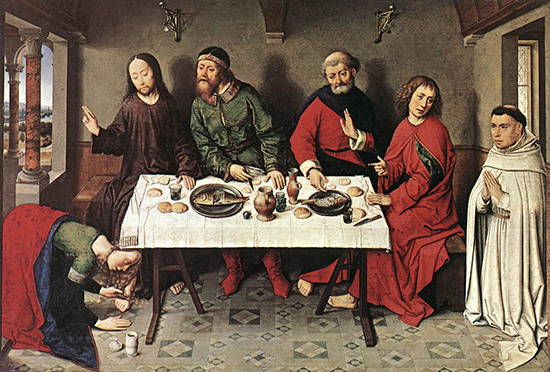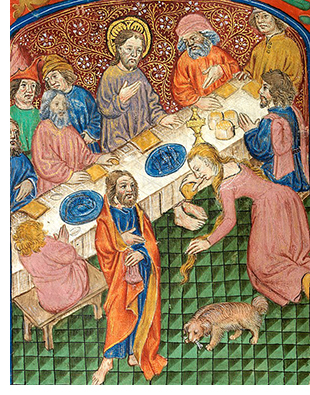
Holy Week: The Anointing at Bethany
by The Revd Canon Dr Simon Jones, Chaplain and Fellow of Merton College, Oxford
- Download 'Reflection on The Anointing at Bethany' (PDF format)

Gabriel Jackson, The Passion of Our Lord Jesus Christ
(listen on Apple Music or Spotify)
libretto compiled by Simon Jones
Almighty God, Father of all mercies,
we thine unworthy servants
do give thee most humble and hearty thanks
for all thy goodness and loving-kindness
to us and to all men.
Behold, a woman in the city, which was a sinner, when she knew that Jesus sat at meat in Simon the Pharisees house, brought an alabaster box of ointment,
And stood at his feet behind him weeping, and began to wash his feet with tears, and did wipe them with the hairs of her head, and kissed his feet, and anointed them with the ointment. (Luke 7.37-38)
We bless thee for our creation, preservation,
and all the blessings of this life;
but above all for thine inestimable love
in the redemption of the world by our Lord Jesus Christ;
for the means of grace, and for the hope of glory.
And he turned to the woman, and said unto Simon, Seest thou this woman? I entered into thine house, thou gavest me no water for my feet: but she hath washed my feet with tears, and wiped them with the hairs of her head. (Luke 7.44-45)
Wherefore I say unto thee, Her sins, which are many, are forgiven; for she loved much: but to whom little is forgiven, the same loveth little.
And he said unto her, Thy sins are forgiven. (Luke 7.47-48)
And, we beseech thee,
give us that due sense of all thy mercies,
that our hearts may be unfeignedly thankful;
and that we show forth thy praise,
not only with our lips, but in our lives,
by giving up ourselves to thy service,
and by walking before thee
in holiness and righteousness all our days;
And they that sat at meat with him began to say within themselves, Who is this that forgiveth sins also? (Luke 7.49)
through Jesus Christ our Lord,
to whom, with thee and the Holy Spirit,
be all honour and glory, world without end. Amen.
The General Thanksgiving
Edward Reynolds (1599-1676)
(Warden of Merton College, Oxford, 1660-1661)
And he said to the woman, Thy faith hath saved thee; go in peace. (Luke 7.50)
St John’s account of the Anointing at Bethany (John 12.1-11), which takes place ‘six days before the Passover’, has been read in the Western Church as the Gospel on the Monday of Holy Week from as far back as the 7th or 8th centuries. In the Jackson Passion it is Luke’s version which is used, with its emphasis on the woman’s extravagant and intimate expression of love and devotion in response to the presence of the forgiving Christ. In this setting the woman is given a voice through the words of the General Thanksgiving, written for the 1662 Book of Common Prayer by Edward Reynolds, who was Warden of Merton immediately after the Civil War (1660-1661).
Role reversal and paradox have important parts to play in the celebration of Holy Week. Today it is Mary who anoints the feet of Jesus; on Thursday it will be Jesus who gets down on his hands and knees to wash the feet of his disciples. Both are intimate, physical acts which upturn expectation and break convention; both have a particular poignancy this Holy Week when even the most basic human contact and interaction are severely restricted, and many of us crave any sort of non-virtual face-to-face encounter which, in any other Holy Week, would be taken for granted.
 In Luke’s account, the Pharisee Simon is not so much shocked by the physical action itself, the wastefulness of such extravagant use of oil, which is Judas’ complaint in John’s Gospel. Rather, Simon is outraged by the fact that it is being performed by a ‘woman in the city, which was a sinner’. Traditionally identified as Mary of Magdala, it’s Mary’s scandalous lifestyle which makes her presence intolerable. Her washing of Jesus’ feet with her tears, wiping them with her hair, before kissing and anointing them, does nothing, in Simon’s eyes, to make her acceptable—there is no redemption for such a one as this. Simon can’t bring himself to tell Jesus what he’s thinking: ‘he said to himself, ‘If this man were a prophet, he would have known who and what kind of woman this is who is touching him’. But Jesus knows exactly what ‘kind of woman this is’, and he is in no way ignorant of what’s going through the mind of his host. And so to help Simon see that Mary’s unrestrained action is no attention-seeking ploy of a notorious evil-liver, but the evidence of salvation in the life of a transformed woman, he points out how differently she has behaved towards him compared with his host, and then declares ‘her sins, which are many, are forgiven; for she loved much’.
In Luke’s account, the Pharisee Simon is not so much shocked by the physical action itself, the wastefulness of such extravagant use of oil, which is Judas’ complaint in John’s Gospel. Rather, Simon is outraged by the fact that it is being performed by a ‘woman in the city, which was a sinner’. Traditionally identified as Mary of Magdala, it’s Mary’s scandalous lifestyle which makes her presence intolerable. Her washing of Jesus’ feet with her tears, wiping them with her hair, before kissing and anointing them, does nothing, in Simon’s eyes, to make her acceptable—there is no redemption for such a one as this. Simon can’t bring himself to tell Jesus what he’s thinking: ‘he said to himself, ‘If this man were a prophet, he would have known who and what kind of woman this is who is touching him’. But Jesus knows exactly what ‘kind of woman this is’, and he is in no way ignorant of what’s going through the mind of his host. And so to help Simon see that Mary’s unrestrained action is no attention-seeking ploy of a notorious evil-liver, but the evidence of salvation in the life of a transformed woman, he points out how differently she has behaved towards him compared with his host, and then declares ‘her sins, which are many, are forgiven; for she loved much’.
In Gabriel Jackson’s setting of this movement which, for me, is the most powerful and beautiful of the whole of his Passion, the words of the General Thanksgiving are Mary’s love song. They give verbal expression to her symbolic action, revealing that her act of unexpected, unconventional devotion is the result of her having known, in the complexity and fragility of her own life, the healing love of the redeemer who covered her sin with the oil of forgiveness.
We bless thee for our creation, preservation,
and all the blessings of this life;
but above all for thine inestimable love
in the redemption of the world by our Lord Jesus Christ;
for the means of grace, and for the hope of glory.
On this Monday of Holy Week, we are invited to consider what song we are called to sing, what part we are called to play, in response to this narrative. As the paradoxical drama of Holy Week begins to unfold, we approach this touching encounter as those who are, for a time, untouched by others. Yet, despite the spatial distance between us, we do not need to remain passive spectators of this meal, observing from afar a text on a page. We have our invitation to Simon’s supper to which Jesus was invited, and through the imaginative use of prayer and meditation, enriched by Gabriel Jackson’s music, we can take our place with Jesus, Simon and Mary.
As we listen to Mary’s soaring love song, we are challenged to balance in equal measure a realistic acknowledgment of our own sinfulness—for we, with her, are ‘unworthy servants’—with thanksgiving that, through his death and resurrection, Christ makes us worthy, pouring on us the healing balm of acceptance, forgiveness and new life. If that is the reality of our God-given identity, then the response we are invited to make is the same for us as it was for Mary—love.
Mary ‘loved much’ because she encountered love in its purest form in the person of Christ, and was changed by it. For us who imaginatively enter this scene with her, the invitation is there to tune our voices to sing in unison with hers, and with Warden Reynolds to show forth God’s praises, not only with our lips, but in our lives, by giving up ourselves to God’s service.
Living and loving sacrificially for the sake of others is the Christian’s vocation not only in Holy Week, but every day of our lives; in times of pandemic and restricted movement as well as in the day-to-day routine which often felt hum-drum, and will do so again, but for which we now long. On this Monday of Holy Week, may Mary’s example inspire us to love much in response to love, and to discover ourselves changed by it.
Father of all mercies,
whose servant Mary Magdalene responded to your gift of forgiveness
by anointing the feet of your Son:
anoint us with your Holy Spirit
that with her we may sing our redeemer’s praises
not only with our lips but in our lives;
who is alive and reigns with you and the same Spirit,
one God, now and for ever.